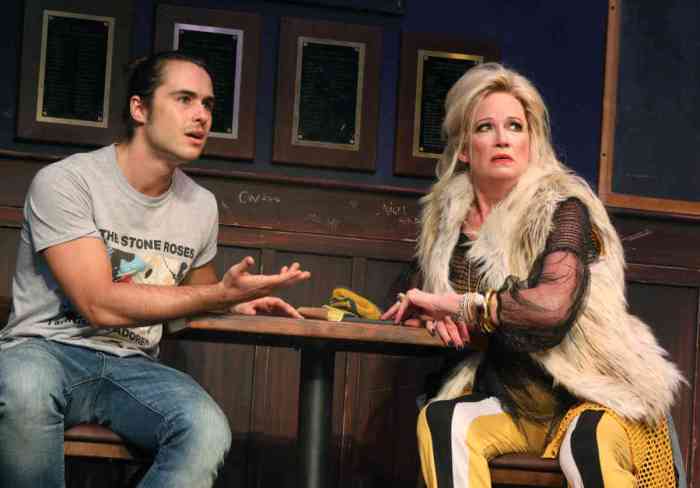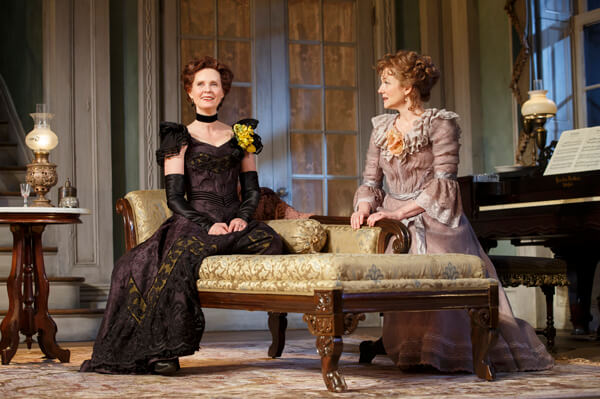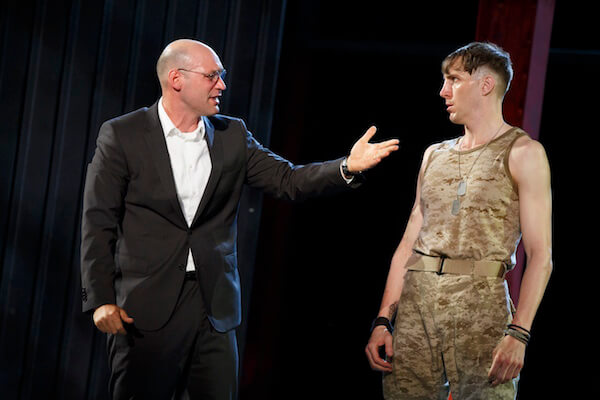Dale Carman and Wilson Bridges in Sidney Howard’s 1926 “The Silver Cord,” directed by Dan Wackerman. | CAROL ROSEGG
A director has two choices when casting a man in a female role –– either play it straight and create a realistic character and a commentary on conventional gender roles or go for camp and hilarity. Dan Wackerman, in directing the Peccadillo Theater Company’s revival of the 1926 play “The Silver Cord,” apparently wasn’t able to make up his mind, and the result while occasionally entertaining is unsatisfying and at times downright creepy.
Dale Carman, who plays Mrs. Phelps, is not untalented, but he’s so all over the map it’s hard to know if one is watching a psychological thriller or a Charles Busch parody. Clutching her pearls, rolling her eyes, and speaking in exaggerated cadence, Mrs. Phelps seems to be the very embodiment of the over-the-top characters Busch loves to satirize. But locked in a too-long kiss on the lips with her son, Mrs. Phelps is suddenly a much darker character. Trying to have it both ways neuters the effect of either approach, and the ensuing confusion quickly becomes tedious.
Wackerman gets no help from the play, a two-ton chestnut riddled with Freudian themes. Mrs. Phelps tries to keep her two sons tied to her as they grow up and strive to be independent. Far from being silver, the umbilical cord she tries to wrap them in is made of tensile steel, forged in desperation and passive aggression. Sidney Howard’s dated script keeps the Oedipal to the metal as the sons struggle to be free of Mommy dearest’s machinations.
Dated play funny when it doesn’t mean to be, while imperfect Shakespeare comedy gets nearly flawless staging
David, the older son, has escaped and come back with a wife, which sets up a battle of wills between mom and daughter-in-law. Younger son Robert has a charming and oh-so-modern fiancée, Hester, but Mumsy manages to scotch that relationship PDQ. This goes on for another two-plus hours as Robert sinks further into codependence while David finally grows a pair and chooses his wife over Mom. Even if your knowledge of psychiatry goes no further than “Freud for Dummies,” this will seem heavy-handed and obvious.
Wackerman hasn’t done much better with the rest of the cast. Neither Thomas Matthew Kelley as David nor Wilson Bridges as Robert has any sense of the period, nor do they express the Freudian conflict of separation at the heart of the play. The women fare much better. Caroline Kaplan is refreshing and brash as the alienated Hester, and Victoria Mack is the best of the bunch playing David’s wife, Christina. She, at least, seems to know the conventions of the era and plays the part with verve and focus.
Watching this production is a bit like stumbling on a creaky old movie on TV when you're in bed with the flu. There’s enough to keep you interested as the fever rages, and while you know it isn’t very good, it’s not so rotten than you can be bothered to change the channel.
Watching “The Comedy of Errors,” an admittedly difficult Shakespeare romp, in Central Park, I was reminded how elusive comedy can be. Even in an uneven production, however, Daniel Sullivan scored plenty of charm and good will. Coupled with the unique pleasure of being at the Delacorte Theater on a balmy summer night, the result offered all the ingredients of a can’t-miss entertainment.
The high points were decidedly the performances of Hamish Linklater and Jesse Tyler Ferguson as two pairs of identical twins — both pairs named Antipholus, a gentleman, and Dromio, his serving man. Separated in a storm at sea, the two sets of twins were raised separately in Syracuse and Ephesus. Each thought the other lost until fate lands the Syracusans in Ephesus and lots and lots of silliness and mistaken identity ensue until it’s all sorted out.
Linklater is one of the most accomplished comic actors working today. Equally at home with sophisticated language and pratfalls, he made a sharp delineation between the two he played. Antipholus of Ephesus is a wheeler-dealer with a hot wife and a swagger, while Antipholus of Syracuse is more restrained and formal. This dichotomy set up much of the hilarity, and Linklater played it all with such clarity it was a joy to watch.
Ferguson had the challenge of playing the low comic Dromio, and his physical comedy was well honed. The two dim-witted but clever Dromios (a Shakespearean staple) were not as clearly distinguished, but Ferguson did a terrific job of giving them different levels of hysteria, and his chemistry with Linklater was very good. It was obvious they had a blast doing this play.
Also very funny were Emily Bergl as Adriana, the Ephesian Antipholus’ wife, and Heidi Schreck as Luciana, her sister. Bergl balanced jealous confusion and heartsickness with physical proficiency that made one sympathetic to the poor woman, even while laughing at her apparent plight.
These four really drove the evening and delivered its most memorable moments. The play was cut to a fast 90 minutes, but even the sharp pencil of dramaturg Robert Blacker couldn’t excise some parts that dragged. Another problem was Sullivan’s decision to direct Jonathan Hadary, as Egeon — the father of the two Antipholuses who has come to Ephesus in search of them even though he knows merchants from Syracuse enter the town on pain of death — to deliver that exposition as if talking to a child. As a result, the show opened on a decidedly ponderous note.
Once things got rolling, however, the fun began in earnest and all was forgiven. The jitterbugging ensemble that entertained before the show and during scene changes –– the show was set in the 1940s for no discernible reason, but why not? –– was charming and the evening’s overall energy was buoyant and festive. Shakespeare couldn’t have intended anything else.
THE SILVER CORD | Theatre at St. Clement’s, 423 W. 46th St. | Jul. 5-6, 11-13 at 8 p.m.; Jul. 10 at 7 p.m.; Jul. 6 & 13 at 2 p.m.; Jul. 7 & 14 at 3 p.m. | $55 at ovationtix.com or 212-352-3101


































